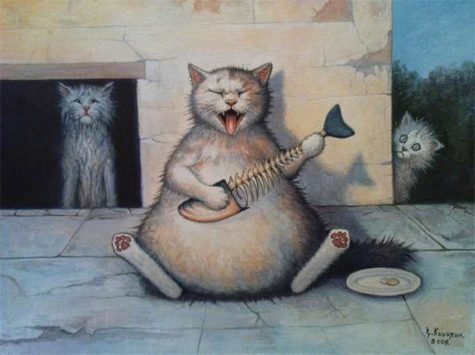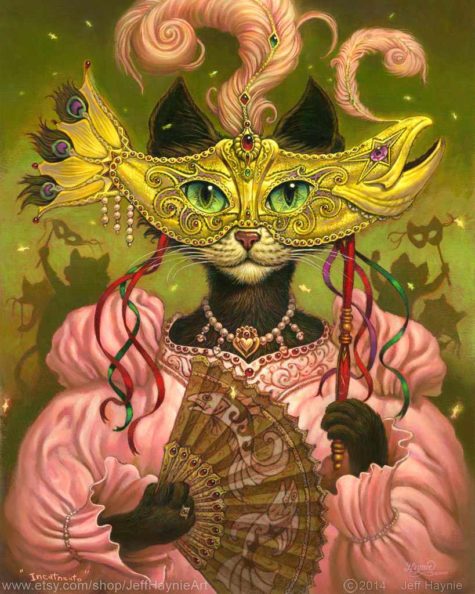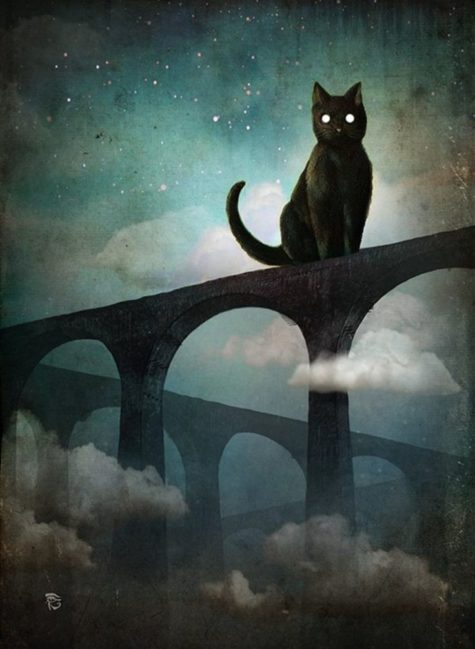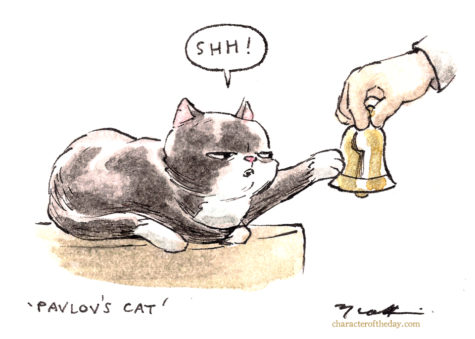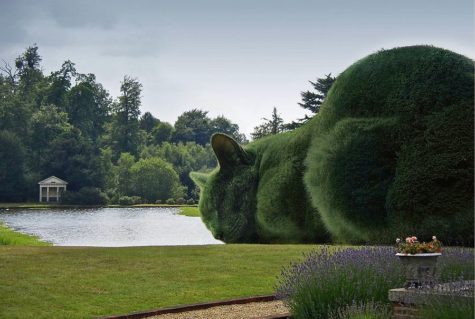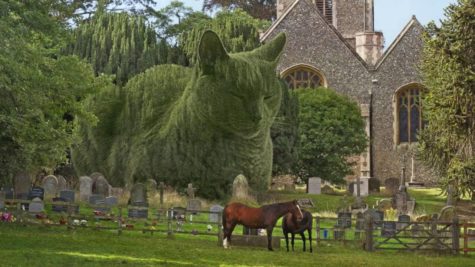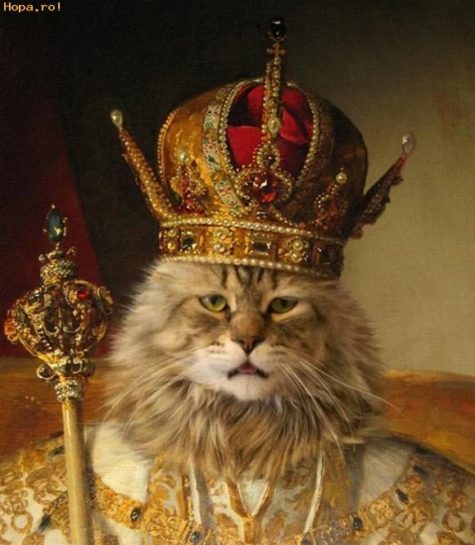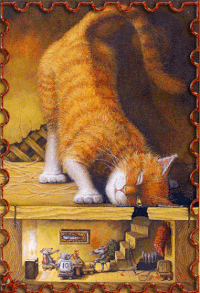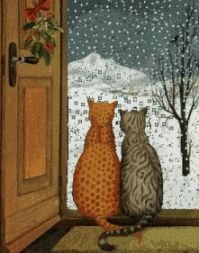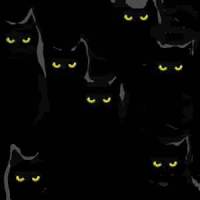Fictional Felines
The Greedy and Ambitious Cat
There was once an old woman who lived in a village. She was half-starved, extremely thin and meager and lived a thrifty life in a dark and gloomy little cottage. This miserable creature had as her only companion a cat as wretched and lean as herself. The cat never saw bread or other people and she had to make do with trying to catch the mice that left their paw prints on the dusty floor of the miserly dwelling.
If the cat was extraordinarily lucky and managed to catch a mouse, she was like a beggar that had discovered treasure. Her face and eyes lit up with joy and she made her treasure – the mouse – last a whole week! In fact she was so admiring of her luck and so distrustful of her own happiness that she said to herself, “Is this really happening or is it just a dream?” for the old woman and the cottage were so miserly that even the mice went elsewhere.
One day, the poor cat was half-dead from starvation and she climbed up onto the roof of the cottage in the hope of finding something to eat. From there she saw a neighbor’s cat walking along the neighbor’s wall as proudly as a lion and so fat that she could hardly walk. The old woman’s cat was astonished to see one of her own kind so plump and large.
In a loud voice, the thin cat called out to her pussy neighbor, “In the name of pity, tell me where you go to get your skin so well stuffed! Why, you look as if you came from one of the Khan of Kathai’s feasts!”
The fat cat replied “Where else should one feed so well but at a king’s table? I go to the house every day about dinnertime; there I lay my paws upon some delicious morsel or other, which serves me till the next. I leave enough for an army of mice, which under me live in peace and tranquility – after all, why should I murder a tough, stringy mouse, when I can easily dine on succulent venison?”
On hearing this, the thin cat asked the way to this house of plenty and begged her plump neighbour to take her with her next time.
“Most willingly,” said the fat cat, “there is plenty for all and I am naturally charitable and you are so thin that I heartily pity your condition.”
Having made the promise, the cats parted company and the thin cat returned to the old woman’s cottage where she told the old woman about the meeting with the fat cat and the plentiful food. The old woman prudently tried to persuade her cat not to go to the house of plenty and warned her to be careful of being deceived, “Believe me, the desires of greedy and ambitious people are never satisfied until their mouths are stuffed with the dirt of their graves. Sobriety and temperance are the only things that truly enrich people.” Said the old woman, “You poor silly cat! Those who travel to satisfy their greed and ambition don’t recognise the good things they already possess. Those who aren’t contented with their lot are never truly grateful for what they do have, but always want more.”
The poor starved cat, however, was so envious of the fat cat’s good fortune and of the king’s table, that the old woman’s good morals and judicious advice went in one ear and out the other. The next day, the thin cat went with the fat cat to the king’s house.
Alas! Before the cats arrived, the king had become weary of having his food stolen or spoiled by a plague of cats. The night before, several grimalkins had robbed the king’s larder and the king had ordered his servants to kill any cats that came near.
The old woman’s cat, however, was pushed on by hunger and entered the house. She immediately saw an unattended dish of meat in the kitchen and seized it. She took the stolen meat under the dresser and, for the first time in years, she filled her lean belly with good food. As she was enjoying the feast, one of the kitchen overseers found his breakfast had gone missing. Seeing the cat eating the stolen breakfast, he threw a knife at the poor creature. Unluckily for the cat, the knife struck her full in the breast.
However, nature had given the cat nine lives instead of one, and the poor puss feigned being dead until the overseer left. She then began to crawl away. Seeing her own blood flowing freely from her breast, the poor cat pledged “Just let me escape this mishap and should I ever become discontent with my own home and my own mice and come looking for morsels from the king’s kitchen then may i lose all of my nine lives at once!”
By Pilpay, an Oriental author circa 300 BC
The Cat Maiden
The gods disagreed on whether it was possible for a living being to change its nature. Jupiter claimed it was possible, but Venus argued that it was impossible. To test the issue, Jupiter transformed a cat into a maiden, and gave her to a young man for a wife. The wedding was duly performed and the young couple sat down to their wedding-feast.
Jupiter said to Venus, “See how becomingly she behaves. Who could tell that yesterday she was a cat? Surely her nature is changed.” Venus responded by letting a mouse loose in the room. When the bride saw the mouse, she jumped up from her seat and tried to pounce on it. Venus then replied, “You see – nothing can change one’s real nature.”
~Aesop
The Lays of Tom-Cat Hiddigeigei
Part I
When through valley and o’er mountain
Howls the storm at dead of night,
Clambering over roof and chimney,
Hiddigeigei seeks the height,
Spectre-like aloft he stands there,
Fairer than he ever seems;
From his eyes the fire-flame sparkles,
From his bristling hair it streams.
And he lifts his voice, and wildly
Sings an old cat-battle song,
That, like far-off thunder rolling,
Sweeps the storm-vexed night along.
Never a child of man can hear it –
Each sleeps heedless in his house;
But, deep down in darkest cellar,
Hears, and paling, quakes the mouse.
Well she knows the greybeard’s war-cry,
Knows the cry she trembles at,
Feels how fearful in his fury
Is the grand old hero-cat.
Part II
From the tower’s topmost angle
On the world I turn my eyes –
Mark, serene, the factions wrangle,
And the parties fall and rise.
And the keen cat’s eyes they see there –
And the cat’s soul feels the joke—
What dull pranks they cut beneath there,
All those petty pigmy-folk.
But what use? For I can’t make ‘em
See things from my point of view;
Even should the devil take ‘em,
‘Twill but be the devil’s due.
Human nature! who can bear it?
Crooked ways and wicked wiles!
Wrapped in consciousness of merit,
Sits the tom-cat on the tiles!
~By Joseph Victor Von Scheffel,
(from Der Tromp eter von Sakkingen, 1880, translated from German).
Pavlov’s Cats
Everyone has heard of Pavlov’s Dogs and many have heard of Schroedingers Cat. But what of Shroedinger’s Dog and Pavlov’s Cats?
Let’s not concern ourselves with Shroedinger’s Dog, a creature so incredibly stupid and perpetually confused it has difficulty being in one state at a time let alone being in two states simultaneously. When put into a box with a decaying vial of poison which might or might not release the poison, Shroedinger’s Dog chews the vial thus ensuring it ended up in a dead state every time.
Pavlov’s Cats is a far more interesting a subtle experiment into feline-human behaviour. Pavlov was a Welsh behavioural scientist who conducted experiments into ringing bells and cats eating food. His experiments went something along the lines of:
- Day 1: Rang bell. Cat buggered off.
- Day 2: Rang bell. Cat buggered off.
- Day 3: Rang bell, but cat put paw on bell so it only made a ‘thunk’ sound.
- Day 4: Rang bell, cat said he’d eaten earlier.
- Day 5: Tried to ring bell, but cat had taken batteries out of bell.
- Day 6: Cat rang bell. I ate food.
Sure enough, the Pavlov’s Cat experiment proves that scientists can be conditioned to eat cat food and that cats eat only when it suits them. Many scientific discoveries have been made accidentally while trying ot prove something entirely different.
The experiment might have worked had the cat not been buggering off to next door where it had already conditions Pavlov’s neighbor to give it a nice plate of chicken liver. Who knows, it might even have rung the bell and conditioned him to open the door as well, just like my cat has conditioned me …
Pavlov’s second attempt, with new cat possibly went something like this:
- Day 1: Rang bell. Cat (white) asleep.
- Day 2: Rang bell. Cat (white) rolled over and snored.
- Day 3: Rang bell. Cat opened eye (blue), yawned, complained about cheap brand of cat food.
- Day 4: Rang bell. After 4 hour delay, cat woke up, ate food, went back to sleep.
- Day 5: Read article about deaf blue-eyed white cats.
- Day 6: Cat woke me up by sitting on head. Fed cat. Bought dog. Dog drools.
From: Moggy Cats Cat Pages
How Cats Got Their Purr
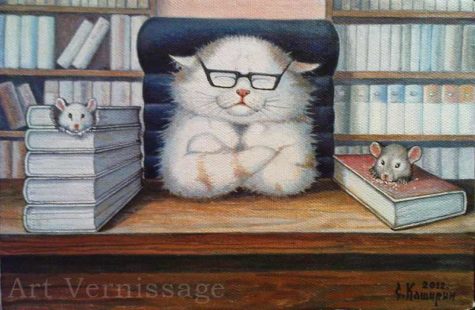
There once lived a king and queen who longed for a baby daughter. Finally, just as they were giving up hope, the queen bore a girl child and the king and queen were the happiest people on earth. Only one thing marred their contentment. A gypsy witch had read the queen’s fortune in return for some food from the royal kitchen and she had predicted that the child would be a girl. The gypsy had given the queen a dire warning and in anger the king had driven the old crone from his land. The old woman’s warning weighed heavily on their hearts.
The old witch had said: “You will bear a daughter and she will be strong and healthy. However, she will fall dead if she ever gives her hand in marriage to a prince. Heed my advice. Find three pure white cats, with not a single white hair upon them, and let them grow up with your child. Give the cats balls of two types to play with – balls of gold and balls of linen thread. If they ignore the gold and play with the linen, all will be well, but should they ignore the linen and choose the gold, beware!”
The king sent out a royal decree and his subjects offered him cats and kittens of all types – tabby cats, ginger tomcats, tortoiseshell mother cats still nursing their kittens; he was offered black kittens, grey kittens and ginger kittens. All of these he sent away again, being only interested in three pure cats. After years of searching, three white cats without a single white hair were duly found and though they came from different places, they became good friends. The three cats loved their young mistress and she adored them. As the months turned into years, the linen balls continued to be the only toys the cats chose to play with. The gold balls lay dusty and forgotten.
When the princess grew old enough to learn how to spin the cats were happy as she was. They leaped at the wheel as it turned and at the thread as the princess spun it, behaving like kittens. She begged her playful cats to leave things alone but they ignored her and continued to play gaily. The queen was so happy that the cats played only with the linen balls and never with the gold balls that she simply laughed at their antics and frolics.
At sixteen years old, the princess was very beautiful. Princes from neighbouring kingdoms and further afield asked her hand in marriage, but she remained indifferent to them all. She was content to live with her three beloved cats. One day, however, a prince arrived who was good and charming, wise and handsome, kind and virtuous and the princess fell deeply in love with him. Though he brought her gifts and visited often, he never once asked for her hand in marriage. One day she could bear it no longer and she confessed her love for him. Delighted and surprise, he expressed his own love for her.
The three white cats were in the tower room playing with the linen balls, but no sooner had the prince and princess professed their love for each other, than the cats seemed to notice the gold balls for the first time ever and began to play with them. In horror, servants reported the dire news to the king and queen. However, it wasn’t the princess who was struck down but the prince. He became gravely ill and nothing the physicians did could ease or cure whatever malady had struck him down.
In desperation the princess sought the gypsy who had made the prophecy about the cats and balls. The gypsy witch told her that there was only one way to save the prince. The princess must spin ten thousand skeins of pure white linen thread before midwinter’s day. It was an impossible task – only 27 days remained before midwinter’s day. No hand but hers could spin the thread and if she span but one skein too few, or one too many, the prince would die at midwinter. The princess rushed to her spinning wheel and worked steadily day after day, but after only a few days she knew she could never spin ten thousand skeins. She burst into tears and her three cats sat by her feet to comfort and console her.
“If you only knew what was wrong I know you’d help me if you could,” she said to the three silent white cats at her feet.
To her amazement, one of the three placed its front paws on her knee, stared into the princess’s face, opened its mouth and spoke to her: “We know what is needed and we know how to help you,” it said. “Cats have no hands, only paws, so we can do the spinning for you and it will not break the terms of the prophecy. Now we must get to work for there is little time left.”
And so it was that the three white cats began to spin, each at a wheel provided for it. Each spun rapidly and beautifully. All day the three wheels hummed and when they were silent as evening came the princess looked into the room to find her beloved cats sound asleep next to hundreds of skeins of thread. The days passed and the skeins increased in number. Each time a skein was finished, the prince’s health improved and the princess grew more hopeful. On midwinter’s eve ten thousand skeins were ready and the prince was almost well.
The gypsy was amazed and please at the cats’ work though she had been cheated of a life. She told the princess to be sure and show her gratitude to her faithful cats. The princess loved her cats well and wisely and she gave them all her glittering jewels, which they had always loved to play with. On her wedding day, they sat in places of honour on magnificent velvet cushions, each cat with a necklace of precious stones around its neck.
As the feast continued, the three cats curled up contentedly on their cushions and – as cats are wont to do – fell asleep. From all three came loud, contented purring. This was the reward the cats had received for their work. Though no cat would ever again speak, all cats would purr like the whirr and hum of a spinning wheel. From that day to this cats have continued to purr whenever they feel contented.
Traditional British Fairy Tale
The Topiary Cat
The King of the Cats
Here’s a great cat story from Ancient Legends, Mystic Charms, and Superstitions of Ireland, by Lady Francesca Speranza Wilde, published in 1887.
A most important personage in feline history is the King of the Cats. He may be in your house a common looking fellow enough, with no distinguishing mark of exalted rank about him, so that it is very difficult to verify his genuine claims to royalty. Therefore the best way is to cut off a tiny little bit of his ear. If he is really the royal personage, he will immediately speak out and declare who he is; and perhaps, at the same the, tell you some very disagreeable truths about yourself, not at all pleasant to have discussed by the house cat.
A man once, in a fit of passion, cut off the head of the domestic pussy, and threw it on the fire. On which the head exclaimed, in a fierce voice, “Go tell your wife that you have cut off the head of the King of the Cats; but wait! I shall come back and be avenged for this insult,” and the eyes of the cat glared at him horribly from the fire.
And so it happened; for that day year, while the master of the house was playing with a pet kitten, it suddenly flew at his throat and bit him so severely that he died soon after.
A story is current also, that one night an old woman was sitting up very late spinning, when a knocking came to the door. “Who is there?” she asked. No answer; but still the knocking went on. “‘Who is there?” she asked a second the. No answer; and the knocking continued. “Who is there?” she asked the third time, in a very angry passion.
Then there came a small voice–“Ah, Judy, agrah, let me in,–for I am cold and hungry; open the door, Judy, agrah, and let me sit by the fire, for the night is cold out here. Judy, agrah, let me in, let me in!”
The heart of Judy was touched, for she thought it was some small child that had lost its way, and she rose up from her spinning, and went and opened the door–when in walked a large black cat with a white breast, and two white kittens after her.
They all made over to the fire and began to warm and dry themselves, purring all the time very loudly; but Judy said never a word, only went on spinning.
Then the black cat spoke at last–“Judy, agrah, don’t stay up so late again, for the fairies wanted to hold a council here tonight, and to have some supper, but you have prevented them; so they were very angry and determined to kill you, and only for myself and my two daughters here you would be dead by this time. So take my advice, don’t interfere with the fairy hours again, for the night is theirs, and they hate to look on the face of a mortal when they are out for pleasure or business. So I ran on to tell you, and now give me a drink of milk, for I must be off.”
And after the milk was finished the cat stood up, and called her daughters to come away.
“Good-night, Judy, agrah,” she said. “You have been very civil to me, and I’ll not forget it to you. Good-night, good night.”
With that the black cat and the two kittens whisked up the chimney; but Judy looking down saw something glittering on the hearth, and taking it up she found it was a piece of silver, more than she ever could make in a month by her spinning, and she was glad in her heart, and never again sat up so late to interfere with the fairy hours, but the black cat and her daughters came no more again to the house.
Borrowed from: Widdershins
